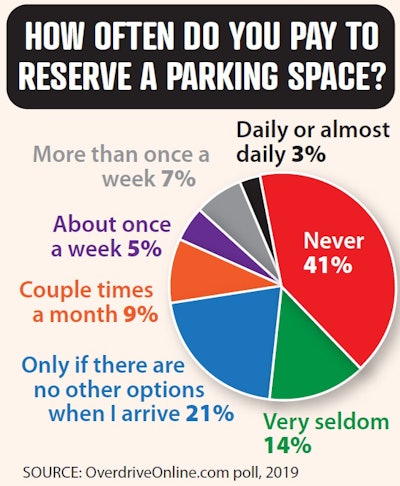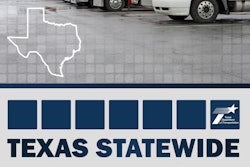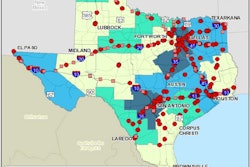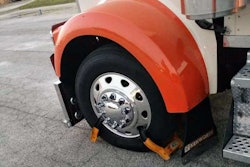Previously in this series: Sometimes, renegade booters get their just desserts
Ensuring you won’t have to risk the potential for a boot is at least possible in today’s world. About one in four owner-operators (24%) in an Overdrive poll report regular use of paid advance parking-reservation systems, which have risen from truck stops and others in recent years as technology has made self-service reservations a reality. Also, the rigors of complying with the electronic logging device mandate added significantly to the luster of paid spaces for truck stop owners and truckers.
Given how stressed parking infrastructure is at night along busy corridors, even a reserved spot might not be truly reserved upon arrival. Among the “very seldom” paid-parking users who responded to the poll, California-based independent Howard Salmon recalls reserving at a TravelCenters of America location in the Baltimore area. When he arrived, all the paid-parking spots had been filled.
 Avoiding some of the risk of getting a truck boot is at least possible now that paid parking reservation systems have proliferated at some truck stops and elsewhere. However, some readers note system flaws, such as paid lots that sell out early and reservations that fail to exist upon arrival.
Avoiding some of the risk of getting a truck boot is at least possible now that paid parking reservation systems have proliferated at some truck stops and elsewhere. However, some readers note system flaws, such as paid lots that sell out early and reservations that fail to exist upon arrival.So many operators, Salmon knows, are grappling with lots increasingly filled to capacity and beyond. Last year, along I-75 at a rest area near Tifton, Georgia, he wheeled in at night to find trucks parked everywhere. He had to flash his four-ways and back carefully out from an improvised alley of parked rigs after meeting an overlength rig choking off the end of the alley. With “no way to get out of the rest area” on the truck side, he says, he backed up all the way to the shoulder of the on-ramp.

The ELD mandate, in tandem with decades of federal attention to the parking issue, has given new urgency to states’ focus on the issue. Most states have responded by studying what they can do to help address parking shortages. As state planning continues, existing spots in particularly congested areas more often seem to come at a price premium.
While paid reservations can minimize the time needed to find a space in an unfamiliar or congested area, relatively few readers seem to use reservations to that effect.
The largest share of any choice in the parking reservation use poll was “Never,” selected by 41% of owner-operators and reflected in comments. A reader posting as “Tam” noted, “Truck stops in general are expensive, and after fuel and food, I am spending $500-plus on average at each stop. I commend Love’s for not jumping on the bandwagon with reserved spots.”
While Earl Harris agreed that truck stop prices can be “excessive,” he emphasized paid reservations as “a convenience. But like all businesses, [truck stops] are in business to provide a needed service and make a profit. I don’t give away my services as an owner-operator, nor do I expect truck stops to give away their services.”
Harris went on: “I use reserved parking when I know I’m going into a tough parking area and will be almost out of driving time. I get a safe place to park, while maximizing my drive time. For that, I am thankful.”
Other readers, while appreciating the intent of paid reservations, pointed to the system’s flaws. “In most urban areas, the pay spots are the only ones available, and many times they are already sold,” wrote a reader posting as “TruckerJohn.”
“Reserving ahead of time,” John continued, can be “difficult for me because I don’t always know how long shippers/receivers will take to load/unload. I run in many metropolitan areas where traffic can also cause a problem. Many times I’ll run out of hours before I reach the place I’ve reserved a spot.”
Or if you do reach it, as Salmon noted, you might encounter a less-than-convenient situation. At the Baltimore-area TA, when he found his reserved spot occupied, he had to wait for TA staff to intervene.
“They went out and found the truck that didn’t have a reservation — they knocked on his door and told him, ‘We will have a wrecker pull you out if you don’t move.’ The guy did move.” That, he adds – also addressing what tow companies acting as private parking-enforcement officers ought to do – is “how it should be done.”











